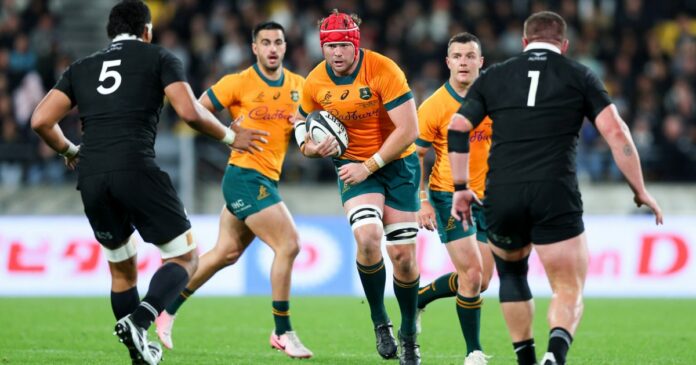
[ad_1]
The Wallabies finished The Rugby Championship in last place. In their first tournament under coach Joe Schmidt, the men in gold recorded just one win from six starts, which doesn’t exactly paint an overly positive picture at first glance.
But, coach Schmidt was quite clear after last weekend’s Test in Wellington that this team is still heading in the right direction. Their goal for the Spring Tour is to continue building depth ahead of next year’s British and Irish Lions Series.
As the international rugby world goes into a brief break before returning for the southern hemisphere sides’ respective end-of-year tours, let’s look back at the winners and losers from the Wallabies’ Rugby Championship campaign.

WINNERS
CARLO TIZZANO
Carlo Tizzano wasn’t picked to play in either Bledisloe Cup Test. With Fraser McReight returning from injury, coach Joe Schmidt and the other selectors turned to the Queenslander as Australia’s first-choice openside flanker once again.
McReight was exceptional. If the Wallabies have one world-class player amongst their ranks at the moment then it’s McReight who would carry that label. There’s absolutely no doubt that, on current form, the breakdown specialist is the Wallabies’ best player.
But, this isn’t about McReight.
It’s just an unusual way to segway back to the selection headache that Schmidt and the coaching staff will have to weigh up during the Spring Tour. Tizzano was sensational in four consecutive starts for the Wallabies and it now seems impossible for the coaching staff to drop him.
After starting on debut against the world champion Springboks in Brisbane, Tizzano went on to play in Perth and then the two Tests over in Argentina. Tizzano finished as the tournament’s third-top tackler with 74 – again, he didn’t play in either Bledisloe Cup Test.
Those numbers and that level of elite performance can’t be overlooked. It’s true that McReight is an incredible backrower, but so is Tizzano, so Schmidt and the coaching simply need to find a place for both of them in the 23.
This could very well be another selection headache like Pocock-Hooper.
DYLAN PIETSCH
Dylan Pietsch wasn’t selected to represent Australia at last year’s Rugby World Cup. Earlier in 2024, coach Eddie Jones had selected the winger as a ‘utility’ ahead of The Rugby Championship, but Pietsch didn’t end up taking the field at all under Jones.
It wasn’t until July when new coach Joe Schmidt selected Pietsch to come off the bench in the first Test against Wales. The 26-year-old came off the pine in another three Tests before finally getting a run in the First XV.
Following an injury to Marika Koroibete and Max Jorgensen’s unavailability due to an illness, Pietsch was named on the left wing before last Saturday’s clash with the All Blacks at Wellington’s Sky Stadium.
Pietsch was brilliant.
The one-time Olympian looked confident with the ball in hand and also held his own on the defensive side of the ball. It’s been well documented but Pietsch used to play in the backrow back in his high school days in Sydney, and it’s not hard to believe.
Pietsch embraces the contact area.
On Stan Sports’ Between Two Posts, former Wallaby Stephen Hoiles highlighted “physicality” as a trait that Pietsch shares with Koroibete. That’s high praise considering Koroibete has twice been named the John Eales Medallist (Wallabies best player in a calendar year).
That was the Wallabies’ last Test before their Spring Tour and Pietsch ticked plenty of boxes. Expect to see the winger starting more matches in Wallaby gold during their upcoming Tests against England, Wales, Scotland and Ireland.
HARRY WILSON
Before playing Georgia in July, Harry Wilson was in Test rugby purgatory. The backrower had continued to perform well at Super Rugby level with the Reds but hadn’t taken the field in a Test match for a couple of years.
But, Wilson took that chance to start against Georgia with both hands, and that high level of performance has carried through to The Rugby Championship. Wilson impressed in both Tests against South Africa before taking up the captaincy over in Argentina.
Wilson has now captained the Wallabies on four occasions, including two Bledisloe Cup fixtures. What’s really impressive about the 24-year-old is how he leads with his actions, and that was abundantly clear in both clashes with the All Blacks.
Not only did Wilson stand out because of his red headgear, but the No. 8 also led the way in terms of work rate—especially in defence. Australia’s skipper finished The Rugby Championship ahead of Ardie Savea (84) with the most tackles out of any player, with 86 stops.
There’s a lot to like about the Wallabies’ new skipper.
Fitting the backrower into the starting side at all seemed like a tough task a few months ago, but now, it wouldn’t make sense if he didn’t have the captaincy. Wilson is the type of player the Wallabies need to look towards as a leader moving forward.
LOSERS
LIAM WRIGHT
In July, everyone was a bit surprised to see Liam Wright given the captaincy ahead of the Wallabies’ first Test of the year. Wright hadn’t played a Test in quite some time, so even he admitted to being a bit surprised by the leadership decision.
The Queensland Reds’ co-captain was solid in that win over Warren Gatland’s Welsh side, but so far, that’s been the backrower’s only Test of the year. Wright has been sidelined with an injury in the months since, and the Wallabies appear to have moved on.
James Slipper took over the leadership role for the next Test against Wales, and then Allan Alaalatoa was named as the captain for the Georgia Test. Harry Wilson, as mentioned above, has also led the Wallabies into battle on four occasions this year.
So again, as far as the captaincy goes, the Wallabies seem to have moved on.
But then there’s Wright’s standing as a first-choice option in the starting side. Rob Valetini has since shifted from No. 8 to blindside flanker to accommodate for Wilson getting a run in a formidable loose forward trio with either Carlo Tizzano or Fraser McReight.
Valetini, McReight and Wilson. That’s a trio that seems to pick itself now.
MARIKA KOROIBETE
Joe Schmidt selected 36 men in the Wallabies’ initial squad for The Rugby Championship. There were some uncapped players who of course made headlines, but the inclusion of one winger in particular was nigh on impossible to ignore.
Marika Koroibete is a two-time John Eales Medallist with a background in both the NRL, Australian rugby and Japan Rugby League One. Koroibete is up there with the likes of David Campese as the best wingers who have donned Wallaby gold.
That’s what makes this so tough to write.
For the first time since last year’s Rugby World Cup, Koroibete was back in Wallaby gold for the team’s clash with the Springboks in Brisbane. The 32-year-old started every other Test in TRC except for last weekend’s fixture across the ditch in Wellington.
Koroibete’s last Test was an underwhelming performance at Sydney’s Accor Stadium. It left some questioning whether coach Schmidt should go in another direction on the Wallabies’ left edge, and eventually, they did with Koroibete sustaining a wrist injury.
The dual international dropped the ball a couple of times in that Test and, just generally failed to fire. For Dylan Pietsch to then take that No. 11 jersey a week later in Wellington and impress, it seems Koroibete may have fallen down the depth chart.
TATE MCDERMOTT
Coach Joe Schmidt was insistent in Wellington that the Wallabies had three genuinely strong options to choose from at halfback. Jake Gordon has started a majority of the Test this year, while Nic White has also been given the nod on a couple of occasions.
But, then there’s Tate McDermott.
McDermott captained the Wallabies last year and appeared to be positioned as the nation’s top option to wear the No. 9 jersey, but that hasn’t quite worked out. McDermott has been regularly called upon off the bench while the other two have been preferred to start.
In the southern hemisphere, maybe there’s a bit of a change of mindset needed when looking at the bench – because, as the Springboks have shown, it’s a genuine position in itself – but no player will tell you that they don’t want to start.
Gordon is clearly the Wallabies’ best option at halfback now and some of the reasoning for that claim might come down to McDermott’s lack of game time.
[ad_2]
Copyright for syndicated content belongs to the linked Source link

